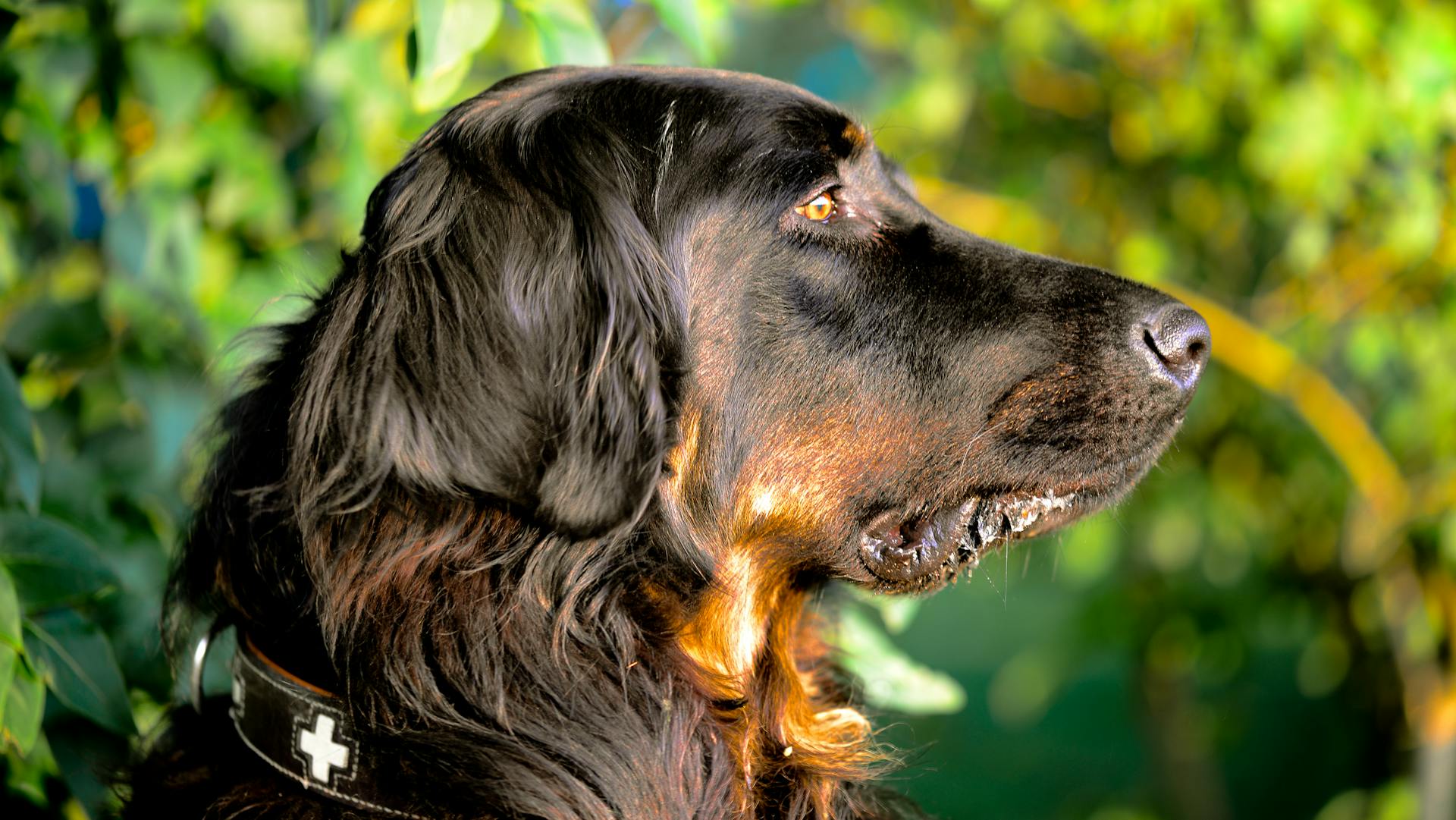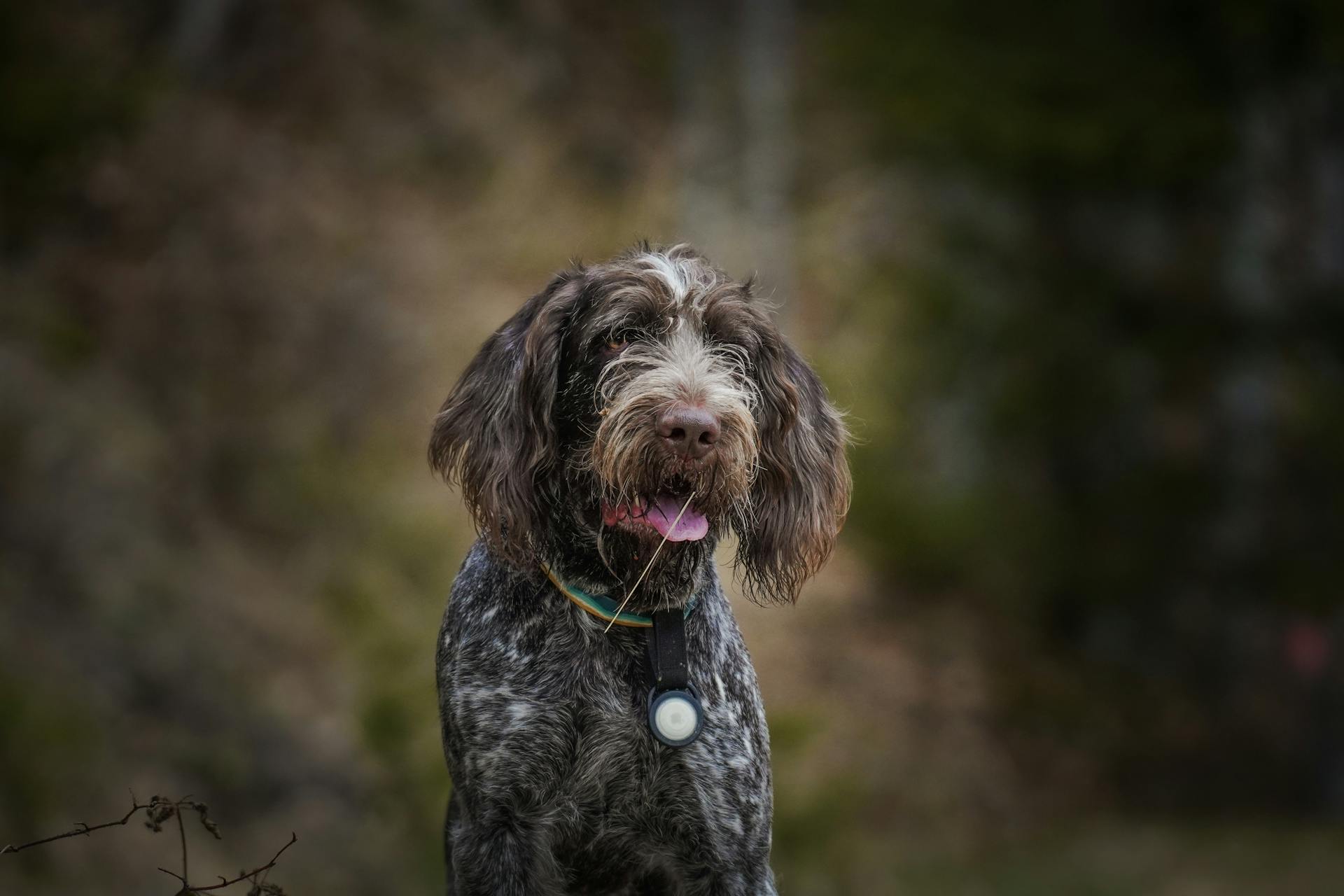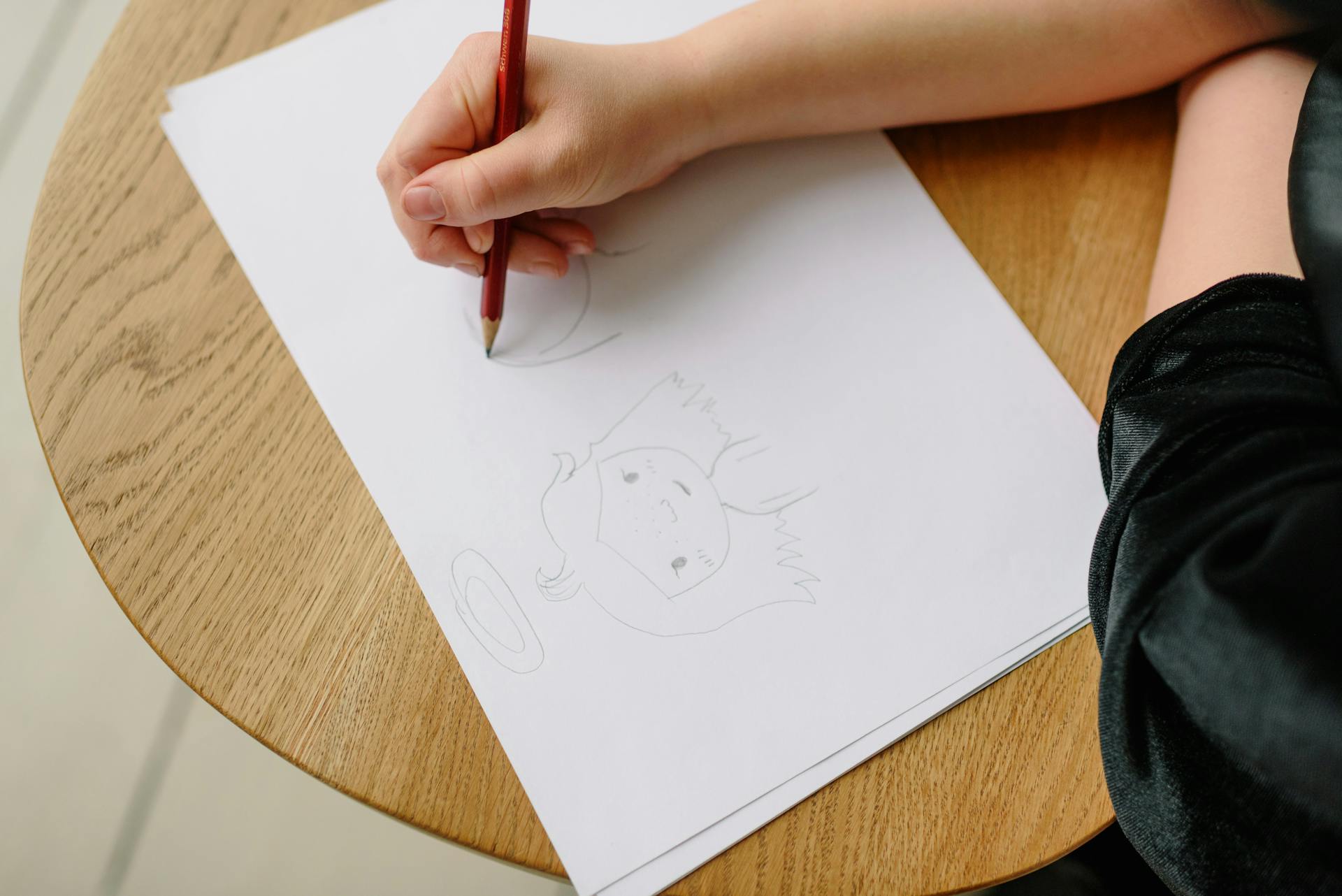
Gordon Setters are a beloved breed, known for their striking appearance and charming personality.
They originated in Scotland in the 16th century, bred to hunt game birds.
Their distinctive black and tan coat is a result of their history as a working dog, with the black coloration helping them blend in with the dark Scottish countryside.
Gordon Setters are a medium to large breed, with males weighing between 70-110 pounds.
They are an energetic breed, requiring regular exercise to stay happy and healthy.
Personality and Temperament
Gordon Setters are full of energy and need regular exercise and mental stimulation to keep them happy. They thrive in an attentive, loving environment and are good family dogs.
They are intensely loyal to their owners and can be great with children, especially when introduced to them during puppyhood. However, they may not be suitable for households with very young children due to their boisterous nature.
Gordon Setters are sensitive and empathic, eager to learn, and need firm but gentle handling. They require 60 to 80 minutes of vigorous exercise daily and should not be over-exercised or begin agility training until they are at least 18 months old.
Their hunting instincts mean they should not be allowed to roam freely if unsupervised, as they are apt to wander into a potentially dangerous traffic situation while following a scent. Early socialisation and obedience training are important to help them develop good habits.
Here are some key personality traits of Gordon Setters:
- Affectionate and loyal
- Typically responds well to training
- Good for an active owner
They are calm dogs at home, but will bark to alert their family or to get attention. They may bark excessively if they're allowed to grow bored, so it's essential to provide them with plenty of stimulation and exercise.
Readers also liked: Rhodesian Ridgeback Bark Sound
Health and Care
The Gordon Setter is generally a healthy breed, but like all breeds, they can be prone to certain health issues. Gastric torsion, also known as bloat, is a serious condition that can be fatal if not treated immediately.
Some common health issues in Gordon Setters include hip and elbow dysplasia, which can impair mobility and cause pain. Eye problems, such as progressive retinal atrophy, can also affect the breed.
Regular exercise, a balanced diet, and regular veterinary check-ups can help prevent or detect these issues early on. A daily exercise routine of at least an hour is recommended to keep your Gordon Setter happy and healthy.
Here are some key health tests to consider for your Gordon Setter:
- Eye Examination
- Physical Examination
- X-Rays
- Blood Test
- Thyroid Tests
Remember, every dog is different, and regular check-ups with your veterinarian can help identify any potential health issues early on.
Pet Care Considerations
Gordon Setters need regular exercise to stay happy and healthy, with at least an hour of physical activity every day.
Exercise should be a mix of physical and mental stimulation, as this breed is very smart and needs to expend their vast energy stores.
Positive training and consistent socialization are essential from an early age to help your Gordon Setter become a well-adjusted member of your family.
The breed's high prey drive means they may follow their nose into trouble, so it's crucial to keep them on a leash or in a securely fenced area.
A fresh viewpoint: How Much Exercise Do Labrador Retrievers Need
Gordon Setters require regular grooming to prevent tangles and mats, with a weekly brushing routine to keep their coat healthy.
Their hanging ears can be prone to ear infections, so cleaning their ears weekly with a dampened cotton ball is a must.
Proper dental hygiene is also essential, with teeth brushing at least twice a week to prevent bad breath and gum disease.
Nail trimming may be needed one or two times a month, depending on the dog's activity level and nail growth.
Here's a summary of the key pet care considerations for Gordon Setters:
Remember, with proper care and attention, your Gordon Setter can live a happy and healthy life.
Health
The Gordon Setter is a generally healthy breed, but like any breed, it's not immune to certain health issues. Gastric torsion, also known as bloat, is a serious condition that can be fatal if not treated immediately.
A 2024 UK study found that Gordon Setters have a life expectancy of 12.4 years, compared to an average of 12.7 years for purebred dogs and 12 years for crossbreeds.
Readers also liked: 100 Years Ago Original Boston Terrier

Hip dysplasia is a common issue in many breeds, and Gordon Setters are no exception. They can also suffer from elbow dysplasia, which affects the development and function of the elbow joints.
Progressive retinal atrophy (PRA) is a genetic eye disease that can lead to blindness. A DNA test is available for PRA in Gordon Setters, and it's estimated that up to 50% of the breed may be carriers.
Gordon Setters are also prone to certain cancers, including osteosarcoma, lymphoma, mammary tumors, and hemangiosarcoma. Regular veterinary check-ups and screenings can help detect these conditions early on.
Here are some common health issues that Gordon Setters may experience:
- Gastric torsion (bloat)
- Cancer (osteosarcoma, lymphoma, mammary tumors, hemangiosarcoma)
- Hip and elbow dysplasia
- Eye problems (progressive retinal atrophy, cataracts)
Investing in pet insurance can help cover the costs of these health issues, and regular veterinary check-ups can help detect them early on.
Exercise and Nutrition
Gordon setters are built for endurance and need at least two hours of exercise per day to stay happy and healthy. This can include activities like long walks, jogging, cycling, hiking, and vigorous playtime.
Dog sports can also provide mental challenges and physical activity, which is great for this breed. They do best with a house and yard, rather than an apartment, and should have a secure space where they can run freely every day.
To prevent them from running off after prey, always keep your dog on a leash or in a securely fenced area when outdoors. They can develop separation anxiety, so don't leave them alone for long periods, whether indoors or outside. Instead, play with them and be there to supervise.
Here are some exercise tips for Gordon setters:
- Long walks
- Jogging
- Cycling
- Hiking
- Vigorous playtime
When it comes to their diet, Gordon setters might eat up to 3 cups of food per day, split into multiple meals. Always have fresh water accessible for your Gordon setter, and provide a quality, nutritionally balanced canine diet.
See what others are reading: German Shorthaired Pointer Diet
Exercise
Exercise is crucial for your Gordon setter's physical and mental well-being. They need at least two hours of exercise per day, which can be met through various activities like long walks, jogging, cycling, hiking, and vigorous playtime.

Gordon setters are bred to run and have good endurance, making them perfect for dog sports that provide mental challenges as well as physical activity.
To meet their exercise needs, consider the following activities:
- Long walks
- Jogging
- Cycling
- Hiking
- Vigorous playtime
A house and yard are ideal for Gordon setters, as they allow them to run freely every day. However, it's essential to keep your dog on a leash or in a securely fenced area when outdoors, as they have a high prey drive and might ignore recall efforts if they see prey to chase.
Gordon setters can develop separation anxiety, so it's crucial to interact with them and provide attention throughout the day. This means you shouldn't leave them alone for long periods, whether indoors or outside.
Nutritional Tips
When it comes to feeding your Gordon Setter, you want to make sure you're giving them the best possible nutrition. Always have fresh water accessible for your dog.
Feeding your Gordon Setter two measured meals per day is a good starting point, but be aware that this breed is prone to bloat, and feeding smaller, more frequent meals can help prevent this issue.
Consider reading: German Shorthaired Pointer Feeding Chart
Your veterinarian can recommend the best diet for your dog based on their health, age, and lifestyle. Consider your pup's needs and choose a food that's approved by the Association of American Feed Control Officials (AAFCO).
Gordon Setter puppies need to eat a puppy-specific food before transitioning to an adult diet. This will ensure they get the nutrients they need for proper growth and development.
To prevent bloat, restrict exercise an hour before and after mealtimes, and avoid using raised food bowls. Slow-feeder bowls can also help reduce the risk of bloat.
Here are some nutritional tips to keep in mind:
- Feed your Gordon Setter multiple smaller meals throughout the day instead of one big meal.
- Consider adding supplements like joint supplements, probiotics, or omega-3 fatty acids (fish oil) to your dog's diet, but only with your veterinarian's approval.
- Choose a dog food that's AAFCO-compliant to ensure your dog is getting all the necessary nutrients.
- Work with your veterinarian to determine the right portions for your dog based on their age, health, and lifestyle.
Adopting or Buying a Dog
If you're looking to bring a Gordon Setter into your life, you have two main options: adopting or buying.
You can find a Gordon Setter puppy from a reputable breeder for around $800 to $2,000 on average.
Adopting from a shelter or rescue group is also possible, but you might have to wait longer than usual since Gordon Setters aren't as popular as some other breeds.
You can get your name on a breed wait list at your local shelters to increase your chances of finding a Gordon Setter.
For more information on finding a reputable breeder or rescue group, check out the resources below:
- Gordon Setter Club of America
- Gordon Setter Rescue
Physical Characteristics
Gordon Setters have a distinctive appearance, with a soft and shiny coat that's longer around the ears, back of legs, chest, tail, and belly.
Their fur can be either straight or have a slight wave, but it's always free from curl or wave.
The Gordon Setter's tail is fairly short in length, thick at the root and tapering to a fine point, and should not reach below the hock.
Their ears are somewhat pointed but are floppy, long, and lie flat, with long and silky feathering on the upper portion.
Gordon Setters have oval-shaped brown eyes, a deep brown color that's truly beautiful.
Their front legs are straight, with elbows held close to the body and set well back, giving freedom of action.
Their chest is deep, but not too broad, with a deep brisket and well-sprung ribs.
The top of a Gordon Setter's body slopes slightly, and in proportion, they are approximately square measured from breastbone to buttocks and withers to ground.
For more insights, see: Straight Backed German Shepherds
Their feet are round and can be described as cat-like, with big and flattened bone.
Gordon Setters are the heaviest of the setter breeds, with males reaching 27 inches at the withers and up to 80 pounds in weight.
Their coat is a medium-length double coat, with a black and tan color that's truly striking.
Males typically weigh between 55 to 80 pounds, while females weigh between 45 to 70 pounds.
Gordon Setters have a life span of 12 to 13 years, which is relatively long for a dog breed.
Their coat color is a beautiful black and tan, with distinctive markings of a rich chestnut or mahogany color on their paws and lower legs.
Gordon Setters have a noble and dignified bearing, which is truly impressive.
Their shoulder blades slope well back, and their forelegs are straight with elbows held close to the body and set well back.
Their pasterns are strong and upright, and dewclaws may be removed.
Their back ribs are deep, and loins are wide and slightly arched.
Take a look at this: Liver Color Brittany Spaniel
The feathers on their upper portion of the ears are long and silky, and on the back of the hind legs are long and fine.
A small amount of white is allowed on the chest, but it's not a requirement.
Gordon Setters have a distinctive appearance that's truly unique and beautiful.
Frequently Asked Questions
Is a Gordon Setter a good family dog?
Yes, Gordon Setters make excellent family dogs with sufficient exercise and patience. They are naturally sociable and friendly with family and close friends.
Do Gordon Setters bark a lot?
Gordon Setters are generally calm indoors, but they may bark occasionally to alert their family or seek attention. They're known as "great talkers," but excessive barking isn't typical of this breed.
What is the difference between a Gordon Setter and an Irish Setter?
The main difference between a Gordon Setter and an Irish Setter lies in their topline and tail set, with the Irish having a gentle incline and the Gordon having a more moderate slope. This distinction affects the overall appearance and structure of each breed.
Is the Gordon Setter a rare breed?
Yes, the Gordon Setter is a rare breed today. Despite its rarity, it remains highly valued for its exceptional hunting ability and loving nature.
Are Gordon Setters smart dogs?
Yes, Gordon Setters are highly intelligent dogs that learn quickly. They thrive on mental and physical stimulation, making them a great fit for active owners who enjoy training and spending time with their pets.
Featured Images: pexels.com

